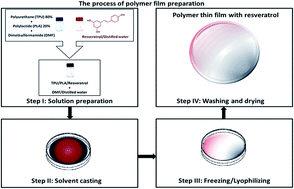Polyurethane–polylactide-based material doped with resveratrol decreases senescence and oxidative stress of adipose-derived mesenchymal stromal stem cell (ASCs)
Abstract
The aim of this study was to evaluate the influence of resveratrol (RES)-doped polyurethane (TPU)–polylactide (PLA) biomaterials on the senescence and oxidative stress factor of adipose-derived stem cells (ASCs) for tissue engineering. Using a four-step method (solution preparation, solvent casting, freezing/lyophilizing, washing and drying), we fabricated TPU/PLA scaffolds doped with different RES concentrations. Then, we established the mass loss and RES release from the obtained films over time using differential scanning calorimetry and UV-Vis spectrophotometry, respectively. ASC was seeded onto the fabricated scaffolds to establish their biocompatibility and biological influence. Using fluorescence microscopy, real-time PCR, and spectrophotometric assays, the proliferation rate, oxidative stress factors, pro-apoptotic, autophagy-related and osteogenic genes expression were evaluated. The obtained data clearly indicated that the TPU/PLA biomaterial doped with 0.5 mmol RES had the most beneficial effect on ASC, whereby it increased proliferation, reduced oxidative stress and apoptosis, and induced the expression of osteogenic genes. Fabricated by our group, innovative biomaterials were characterized by their RES release in a sustained manner. A prolonged release of RES is especially important when considering clinical application. The release of RES was most intense during the first 20 days, which may be beneficial in vivo as inflammation within damaged tissue is most intense during the first days after injury. The fabricated material directed ASC toward an osteoblast-like molecular phenotype, which suggests it could be a promising tool in regenerative medicine. The combination of the scaffold with ASC may improve the effectiveness and shorten the time for bone regeneration. These characteristics presented here make the biomaterial a promising tool in the emerging field of personalized regenerative medicine, especially in geriatrics.



 Please wait while we load your content...
Please wait while we load your content...